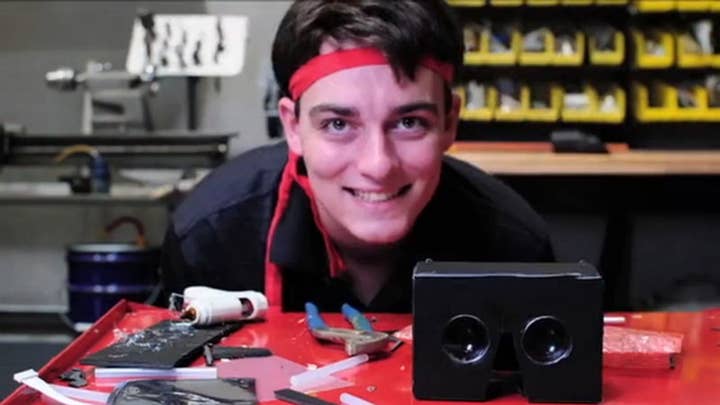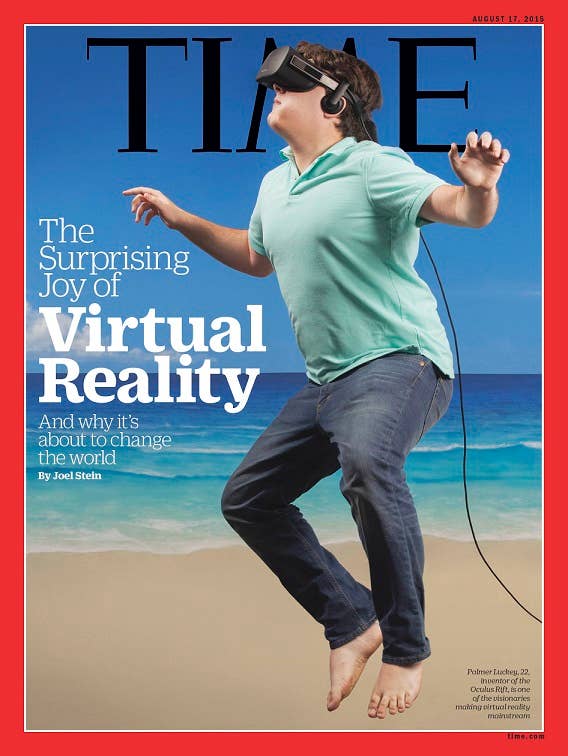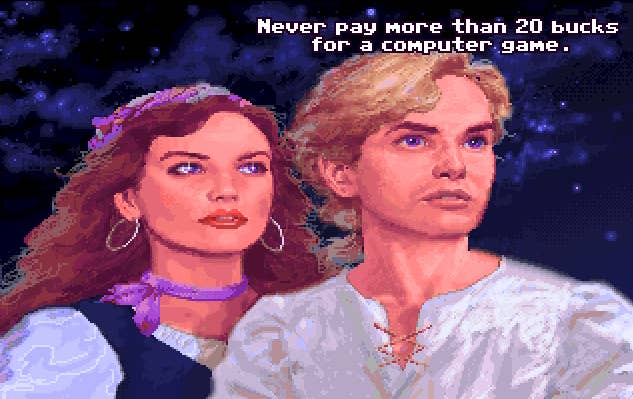Join the GI Each day right here to get the most important information straight to your inbox
The fashionable period of digital actuality as we all know it began round June of 2012, when John Carmack introduced the Oculus Rift to the Digital Leisure Expo and confirmed it off to attendees with Doom 3 BFG Version.
It ramped up rapidly that August with the launch of the Oculus Rift Kickstarter campaign, which featured testimonials from trade legends like Carmack, Valve’s Gabe Newell and Michael Abrash, Epic’s Cliff Bleszinski, Unity’s David Helgason, and David Helgason’s popped collar. That marketing campaign began with a $250,000 objective, and ended its run with greater than $2.4 million from backers.
VR continued to construct hype within the intervening years, however principally within the background. There was nonetheless no business product on cabinets by March of 2014, and between the exploding (in a great way) cellular market, the exploding (in a nasty approach) devoted handheld and Facebook social gaming markets, and the longest-awaited new era of consoles commanding lots of the headlines, there have been loads of different happenings available in the market that appeared to take priority.
In March of 2014, it transitioned from the background of the trade to the foreground as it reached a vital mass of occasions that nudged it from a far-flung future tech to one thing that might be simply across the nook.
VR dominated the discourse across the Sport Builders Convention that 12 months, and EA CEO Andrew Wilson was marshalling the writer’s sources to guarantee traders the corporate would sustain with this sizzling development (and even the one after it).
“Once I have a look at any of the VR gadgets, I have a look at that not by way of ‘What’s that system going to ship?’ however a want for players to have a unique sort of modality – the ‘Get In’ sort of modality, proper?” Wilson stated in a panel at that month’s SXSW Gaming convention. “That is perhaps delivered to you thru a headset, or by some hologram that evolves out of your lounge ground.”
Additionally at GDC, Sony introduced it was stepping into the market with the PSVR headset, unveiling its Undertaking Morpheus VR headset on the Sport Builders Convention and giving demos on the present ground. It would not launch for 2 extra years, however Sony was the most important identify to but make a full-throated dedication to VR.
That designation did not final lengthy, as only a week later Facebook (now Meta) introduced that it was buying Oculus for $2 billion.
The information was surprising, not least of all as a result of Oculus’ Palmer Luckey had instructed us in an interview revealed earlier that month that he had no real interest in promoting the corporate.
“We do not wish to be assimilated into somebody who’s going to have us engaged on their very own… imaginative and prescient of VRPalmer Luckey, three weeks earlier than Oculus offered to Facebook
“We wish to do issues our approach,” Luckey stated. “There are definitely people who find themselves … however we have now a imaginative and prescient for our shopper product and we all know that we’re going to have the ability to pull it off. We do not wish to be assimilated into somebody who’s going to have us engaged on their very own product or their very own imaginative and prescient of VR – we wish to have the ability to ship our personal imaginative and prescient of what VR is.”
He acknowledged that it will be potential some huge firm would simply identify a worth so excessive he would take the cash, “However I do not assume there is a affordable quantity that will make me say, ‘You understand I used to be going to vary the world with VR and attempt to change humanity eternally however here is a quantity.’ It truly is about ensuring that we get to ship our imaginative and prescient of shopper digital actuality.”
We weren’t the one ones shocked by the information. Carmack, who had since left Id Software program to take a full-time function as CTO of Oculus, stated he was not concerned in negotiations and unaware the deal was occurring.
One motive the deal was so stunning is that it was virtually an impulse buy by company requirements. Oculus CEO Brendan Iribe stated the corporate took simply three days to barter the sale.
At that time, Facebook was seen within the video games trade primarily as the platform that enabled essentially the most obnoxious embodiments of free-to-play gaming, and one which was (rightly or wrongly) perceived as a handed fad.
Nonetheless, there was optimism. Advantage LLC CFO Asif A. Khan predicted that the $2 billion price ticket “will seem low cost 5 years from now.”
VR hadn’t actually exploded to the purpose the place $2 billion regarded low cost in 2019. And whereas it nonetheless hasn’t, the preliminary buy worth of Oculus completely seems low cost at present when in comparison with the $4 billion or so Meta is losing every quarter from its Reality Labs division as it continues to attempt to make its unique Oculus funding repay.

In a GamesIndustry.biz employees roundtable, our former author Steve Peterson had a very clear-eyed view of the sale, saying, “Nonetheless you have a look at it, it is a moonshot for Facebook. Possibly there are diamonds on the moon, however we cannot see them on the market any time quickly. If I used to be a Facebook investor, I do not assume this may change my ideas on the inventory – besides that they’ll have much less money helpful.”
A decade down the road, VR is in a lot the identical place. It stays Meta’s moonshot, a drain on its money reserves that doesn’t appear to be providing diamonds on the market within the close to future.
In contrast to the tendencies of stereoscopic 3D or blockchain, digital actuality is confirmed to have precise utility. What it hasn’t achieved is definitely repay the hype commercially.
The Oculus Rift noticed its business debut in March of 2016, and really launched instantly into the trough of disillusionment.
Two months earlier than the Rift launched, market analysis agency Superdata was all-in on the VR section, projecting an put in base of 38.9 million headsets and revenues of $5.1 billion by the tip of the 12 months. It lower that income projection by 30% across the headset’s arrival in March, and one other 22% in April.
By the point November rolled round, Superdata referred to as VR “the most important loser” of the vacation season, with whole headset gross sales for the 12 months clocking in simply over 4.1 million.
VR wasn’t precisely useless on arrival, but it surely was completely over-hyped, a cool novelty with intriguing potential for the long run, however a litany of hurdles standing between it and widespread shopper adoption.
In a March 2014 interview with us, Oculus’ Nate Mitchell stated the large sticking level can be VR getting its personal Wii Sports activities, that means a system-selling product that correctly explains the worth of VR to the plenty.
“After getting the content material and folks expertise it, they get it,” Mitchell stated. “Proper now, we’re on this very cloudy section. You really want these experiences to assist individuals perceive – most individuals simply cannot droop disbelief.”
That was a chicken-and-egg drawback, as a result of it was powerful to justify spending the large bucks on a extremely polished VR sport when there wasn’t an put in base to promote it to, but it surely was powerful to have an put in base when you did not have a bunch of high-quality video games to justify individuals investing in a VR headset.
However it’s 2024 now and we have got nice VR video games. We’ve Half-Life: Alyx, Beat Saber, Horizon: Name of the Mountain, Moss, and a slew of conventional video games that occur to play properly with VR, like Tetris Impact, Resident Evil Village, and No Man’s Sky. There isn’t any one headset that runs all of these video games, sadly, however at the very least being a hardcore technophile is not a prerequisite to VR adoption.

As for the opposite hurdles, we have seen all of them addressed at the very least partially as VR (and AR) expertise advanced with the HTC Vive, Home windows Combined Actuality headsets, Magic Leap, PSVR 1 and a couple of, the Valve Index, and the Apple Imaginative and prescient Professional. We’ve higher interfaces and movement monitoring. We’ve gesture controls. We’ve simpler set-ups. We’ve higher framerates and resolutions, lighter headsets, all-in-one options so gamers do not must be tethered to a robust laptop. We’ve cheaper headsets (at the very least outdoors of the questionable strap-a-phone-to-your-face paradigm). We’ve checked off nearly each field that individuals instructed us was standing in the best way of the VR revolution actually taking off.
That is all nice, however the issue in my eyes is that we have made all this progress because of firms keen to spend money on the sector, and at the very least on the {hardware} aspect, these investments do not seem to have been paying off. Sony, Meta, and Apple are sufficiently big gamers that the three of them may preserve VR a fruitful and rising area, however truthfully, Sony and Apple have proven questionable dedication to the trigger. Regardless of launching two VR headsets, Sony has not proven an incredible urge for food for supporting them with advertising and marketing or software program. And whereas Apple has solely only in the near past taken its VR efforts public, the sky-high worth level and nearly full lack of gaming purposes counsel it will not be the Chosen One to take VR gaming mainstream both.
That leaves Meta, which has nearly inarguably achieved extra for VR than every other firm over the previous decade, however I truthfully do not know the way for much longer a publicly traded firm might be anticipated to lose greater than $1 billion a month chasing a metaverse imaginative and prescient that has largely fallen out of vogue and is just turning into a much bigger and greater joke the longer it continues to not occur.
It does not look more likely to flip the nook anytime quickly, as Meta stated in its newest quarterly earnings, “For Actuality Labs, we count on working losses to extend meaningfully year-over-year because of our ongoing product improvement efforts in augmented actuality/digital actuality and our investments to additional scale our ecosystem.”
The necessity to change that is not as pressing as you would possibly count on contemplating Meta nonetheless reported greater than $39 billion in income final 12 months regardless of the Actuality Labs losses, however shareholders aren’t recognized for his or her persistence on the subject of extended boondoggles, and I fear the VR gaming market as it exists at present hinges solely on Mark Zuckerberg by no means studying up on this “sunk value fallacy” individuals within the workplace preserve whispering about.

Oops! All Reactionaries
Whereas many VR proponents have been joyful to have the legitimacy (and deep pockets) of an enormous tech firm like Facebook signalling a brilliant and profitable future for the sector, there was additionally a subset of builders and Oculus backers sad with the choice, together with Minecraft creator (and early Oculus investor) Markus ‘Notch’ Persson.
“Facebook shouldn’t be an organization of grass-roots tech fans,” Persson stated in a weblog put up. “Facebook shouldn’t be a sport tech firm. Facebook has a historical past of caring about constructing consumer numbers, and nothing however constructing consumer numbers. Individuals have made video games for Facebook platforms earlier than, and whereas it labored nice for some time, they have been caught in a really unlucky place when Facebook finally modified the platform to higher match the social expertise they have been attempting to construct.”
These criticisms would possibly sound odd coming from a developer who offered his firm to Microsoft, towards which you may levy loads of related criticisms (and certainly, Persson already had). However that sale would not occur till later in 2014, so the Minecraft developer had the moral greater floor for at the very least somewhat bit.
“I undoubtedly wish to be part of VR, however I cannot work with Facebook”Marcus ‘Notch’ Persson
“I undoubtedly wish to be part of VR, however I cannot work with Facebook,” Persson stated. “Their motives are too unclear and shifting, and so they have not traditionally been a secure platform. There’s nothing about their historical past that makes me belief them, and that makes them appear creepy to me. And I didn’t chip in ten grand to seed a primary funding spherical to construct worth for a Facebook acquisition.”
The weirdest a part of this is not that Persson did not just like the route Oculus was taking with Facebook, or that he was going public together with his complaints. Each of these have been very a lot consistent with his public persona on the time, which was largely optimistic. However so was Luckey’s.
And that is the bizarre bit, taking a look at it in 2024. Only a decade in the past, Persson and Luckey have been counted among the many pleasant faces of the trade, influential creators who have been extensively celebrated by friends and press alike.
In any case, Persson vocally supported indies and unfold his wealth among the many Mojang crew extra extensively than he was contractually obligated to.
As for Luckey, he definitely sparked a renewed curiosity in VR, however past that, uh, I assume he smiled rather a lot, was actually smitten by VR, and his story of a teen cobbling collectively headsets in his dad and mom’ storage is the form of Silicon Valley mythologizing that individuals used to like shopping for into.
(Look, on the subject of the stipulations for public reward past making a well-liked sport or being financially profitable, we have not set the bar terribly excessive on this area, of us.)
Each would obtain the triple crown of rich past perception, empowered to pursue just about any skilled or private objective, and with glowingly optimistic reputations in addition. However that trifecta is outwardly each bit as laborious to carry on to as it’s to achieve within the first place.
We have been simply 5 years away from Persson embracing sufficient poisonous views round transgender individuals, race, feminism, and different topics that Microsoft all however excommunicated the creator of its greatest gaming franchise. He chipped away at his popularity one Unhealthy Tweet at a time till there wasn’t a lot left however an absurd mansion with a $200,000 sweet wall that he insists is not rotten.
Notch chipped away at his popularity one Unhealthy Tweet at a time… Luckey’s reputational downturn was not so drawn out
Luckey’s reputational downturn was not so drawn out. Simply two years after the Oculus sale, Luckey was revealed as the cash man behind a Trump-backing “shitposting” group, a revelation which prompted a swath of builders to swear off working with Oculus and noticed Luckey disappear from the limelight for a handful of months earlier than leaving Facebook solely. (Luckey would later say he was fired.)
Luckey rapidly moved on to his subsequent start-up in a area the place his political beliefs weren’t so disqualifying, a protection contractor utilizing expertise to crack down on unlawful immigrants on the US-Mexico border. (There was no phrase on whether or not he received Mexico to pay for it.) And if that wasn’t fascist nerd vice-signalling sufficient, Luckey named that firm Anduril after the sword Aragorn carries in The Lord of the Rings, which suggests “Flame of the West” in one in all Tolkien’s fantasy languages.
In a Financial Times feature on Anduril revealed simply this morning, Luckey blows the white supremacist canine whistle somewhat louder, saying, “The primary web page of our first pitch deck stated that Anduril will save western civilisation and save taxpayers a whole lot of billions of {dollars} a 12 months as we make tens and tens of billions of {dollars} a 12 months.”
That twin pitch of subjugating foreigners and making obscene quantities of cash apparently proved interesting to billionaire Peter Thiel, an early supporter of Anduril who has backed it to the tune of $400 million by his Founders Fund agency.

Luckey’s shift to arms dealing was a stunning flip for a lot of, however wanting again, there have been all the time some indicators that the pleasant face of VR wasn’t precisely as it appeared. In that interview we did with Luckey the place he talked about not promoting the corporate even had him foreshadowing the potential for a fall from grace. (And if not “grace,” precisely, then no matter you wish to name the purpose the place you get a Time Magazine cover, however individuals joke that it single-handedly killed VR.)
“VR has come again now the place it is captured the general public curiosity, and individuals are actually thinking about VR once more,” Luckey instructed us. “It is not possible that it is going to die nearly no matter I do. I may have a loopy meltdown and go beat it on the streets of San Diego [and VR would move forward].”
First off, that is a certifiable Good Name proper there. In some ways in which hypothetical San Diego state of affairs would have been preferable to what he truly did, but the VR trade has certainly continued to maneuver ahead, thanks largely to Meta spending obscene quantities of cash to make a actuality out of the metaverses that captured individuals’s creativeness in Neuromancer and Snow Crash (or the one which nostalgically cataloged and regurgitated creativeness in Prepared Participant One).
Luckey’s willingness to supply a horrifying psychological picture unprompted exhibits an eyebrow-raising disregard for social norms, however there’s solely a lot criticism we are able to direct his approach on that one. In any case, we have been complicit in subjecting our viewers to that significantly cursed payload a decade in the past, and have apparently not reformed our methods contemplating we simply introduced it up once more two paragraphs in the past.
Later within the interview, Luckey additionally talked about the actual second of reality for VR, a Minority Report-like gesture monitoring system with haptic suggestions.
He rightfully pointed to the usual sport controller and its hodge-podge of sticks and buttons as an intimidating barrier for a lot of non-gamers to beat, and envisioned a world the place VR opens up the trade to model new audiences… who in his thoughts truly need the identical previous experiences.
“You could possibly give any grandma a VR headset and provides her a digital gun and she or he may shoot it”Luckey on VR bringing the enjoyment of video games to new audiences
“The important thing factor to recollect is a few sorts of interactions are completely not possible to do with a sport pad,” Luckey stated, including, “Individuals spend their complete lives studying the right way to look around the globe and work together with their world. You could possibly give any grandma a VR headset and provides her a digital gun and she or he may shoot it. You give her a 360 sport pad… it is simply not going to occur.”
And right here I all the time thought nana was horrified watching me play my favourite video games as a result of they principally centered across the callous violence of taking one other life, however the actual drawback was simply the interface! Luckey and my candy ol’ nana each knew the homicide of a human being should not be abstracted right into a easy button push; it must be extra visceral. I needed to actually get my arms in there with haptics that permit me really feel a spinal column snap, adopted by the faintest flutter that may have been my sufferer’s soul leaving its physique, or maybe simply my very own quivering ecstasy from the kill. That is the way forward for VR proper there!
I have been scripting this column for over eight years now, and it is fairly widespread to run into information tales of individuals like Luckey and Persson, individuals whose reputations have modified drastically within the intervening years. Generally these tales present clear indicators of what’s to return, and different instances a lot much less so.
Having seen who Luckey is at present, we are able to search by the mountains of public interviews he gave on the time for hints of that future. I’ve seen a good bit of stuff price elevating an eyebrow to, and issues that definitely match with what we all know now. However to be honest, I do not assume there’s sufficient there – at the very least from what I’ve seen – for somebody to have been in a position to definitively establish Luckey as a xenophobic-fascist-in-waiting primarily based solely on his press clippings and public feedback.
And I feel that is most likely saying much less about Luckey than it does concerning the video games trade of the time, when an individual in knowledgeable setting casually describing themselves participating in public masturbation was not thought of a matter to be referred to human sources a lot as a little bit of persona appropriate for the face of an rising expertise with mainstream aspirations.
Looking back, it shouldn’t be that stunning that the video games trade and the tradition surrounding it will produce individuals with the politics of Luckey and Persson. If something, possibly we ought to be stunned such outcomes aren’t extra widespread.
What Else Occurred in March of 2014
● In a surprising (OK, possibly not so surprising) flip for the “Will not someone consider the kids?” crowd, California State Senator Leland Yee was arrested on public corruption and arms trafficking fees. In 2005, Yee launched state laws requiring violent video games to be labelled and banning their sale to minors, a regulation that will be contested and wind up earlier than the US Supreme Courtroom, resulting in a ruling that video games qualify for First Modification protections on free speech. Yee was sentenced to 5 years in jail.
● Epic transformed Unreal Engine’s enterprise mannequin from a one-time license price to a subscription service with income sharing. It could solely have that setup for a 12 months earlier than it dropped the subscription a part of the deal in favor of a purely royalty-driven mannequin.
● Phil Spencer took over as Microsoft’s head of Xbox. At this level, he is been working the present over there longer than anybody within the model’s historical past.
How has he achieved with it? On the one hand, the Xbox division is popping a revenue, which has been removed from a given over the previous quarter century, and it controls a formidable catalog that includes lots of the trade’s greatest franchises. Alternatively, that catalog represents Microsoft’s penchant for acquisitions greater than its capacity to make hits. And Xbox can be in third place of the large three console makers and in an ungainly center floor as a platform holder that’s legally and logistically prevented from going absolutely unique, but additionally too involved about fanbase backlash to go absolutely multiplatform.
● It could appear bizarre now, however in 2014, Sony’s subscription service (PlayStation Plus) was the one recognized for that includes huge new releases whereas Microsoft’s service (Video games with Gold) usually relied on reheated leftovers from years previous. Spencer stated he was working to vary that, and with Sport Cross, I suppose he did.
● In the meantime, PlayStation was seeing a rash of high-profile departures as Jack Tretton stepped down as CEO of SCEA, Amy Hennig left Naughty Canine, and Stig Asmussen left Sony Santa Monica.
● GameStop shut down its cloud streaming division Spawn Labs three years after buying it, saying “the gaming shopper has not but demonstrated that it is able to undertake the sort of service to the extent {that a} sustainable enterprise might be created round it.” It as an alternative invested in its Expertise Manufacturers and cellular phone retailer enterprise, which it will additionally surrender on 4 years later.
● Digital Arts’ reign atop The Consumerist’s Worst Firm in America ballot ended with a first-round loss to Time Warner. EA had received all the bracket the earlier two years, however with out a Sim Metropolis always-online debacle or a Mass Impact 3 ending uproar recent in voters’ reminiscence, it simply could not pull off the threepeat.
Good Name, Unhealthy Name
BAD CALL: Longtime free-to-play advocate Ben Cousins gave a GDC discuss through which he introduced an analytical mannequin for figuring out how moral a sport’s enterprise mannequin is.
We’re already on the Unhealthy Name level once you’re attempting to assign a numerical worth to the moral qualities of a kind of sport, significantly after we arrive at that quantity by a collection of sure/no questions that add or subtract one level to a complete moral scorecard.
However it will get even much less critical once you see that Cousins’ questions aren’t “Is the sport designed like a Skinner field to foster life-consuming habits and extract essentially the most sum of money from the relative handful of the inhabitants that proves most susceptible to that design?” however as an alternative are extra alongside the traces of “Can the patron play the sport earlier than spending?” and “Is the minimal buy measurement beneath $20?”

GOOD CALL: In a GDC discuss, Nationwide Endowment for the Humanities senior program officer Jason Rhody implored builders to archive the paperwork surrounding the artistic course of behind their video games, centering his discuss on a 1607 journal manuscript depicting cats and birds with primitive jetpacks hooked up to their backs, with the concept that they might be used to infiltrate and burn villages and castles.
“The lesson of rocket cat is that you do not know what hidden easter egg, what manuscript, what materials hint will trigger a future scholar’s coronary heart to swell with pleasure once they discover it,” he stated.
And if builders at present want a extra financially rewarding motive, they will have a look at the reward retro specialist Digital Eclipse has acquired for Llamasoft: The Jeff Minter Story, The Making of Karateka, and Atari 50: The Anniversary Celebration, all of which use that form of archival materials as a key promoting level.
BAD CALL: In speaking about Epic’s new subscription/royalty-based mannequin for the Unreal Engine, Tim Sweeney pointed to Id Software program’s commendable resolution to launch the Doom and Quake supply code to the neighborhood as a standard factor that will occur and never an excessive outlier.
“The good factor in that space is with this royalty mannequin, finally the sport is given away as a result of the developer decides the gross sales have trailed off and now they’re simply going to open it as much as the world to have for enjoyable, as id Software program and different firms have achieved prior to now,” Sweeney stated. “And 5percentt of zero is zero. So there isn’t any accounting required or royalties required.”
On the one hand, you may attempt to argue Sweeney brute pressured this right into a Good Name by establishing the Epic Video games Retailer and making a gift of previous video games totally free for years now. Alternatively, it is undoubtedly a Unhealthy Name as a result of publishers within the enterprise of promoting video games aren’t going to be giving them away in any important numbers, and even the Epic Video games Retailer promotions aren’t free a lot as Epic is paying tens of millions for the video games as an alternative of customers.
BAD CALL: This GDC discuss serves as a reminder of the darkish instances when the whole lot of gaming tradition determined to have a spherical of “Does [name of game] even rely as a sport?” discourse. I think about on the time it sounded preferable to having one other argument over sport genres, but it surely was not, and that was a Unhealthy Name.
Join the GI Each day right here to get the most important information straight to your inbox
